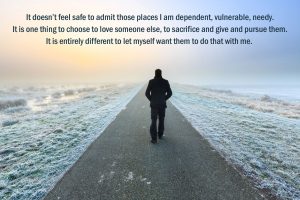three simple steps toward a life that god desires
“How do we quit stepping on each other’s toes? It seems like every time we start into this dance it ends up in more hurt, more distance, and less hope that our relationship can ever be a place of safety and promise.”
Quick, slow, slow…quick, slow, slow…quick, slow, slow seems like a simple rhythm to learn for a dance—and maybe it is when you start learning the steps by yourself—but adding a partner to the mix can be more complicated to coordinate. And learning the new step is doubly complicated when you and your partner have already mastered different steps that end in less accord. Learning to step in harmony often requires something more than just good instruction like we are given in James 1:19-20: “My dear brothers, take note of this: Everyone should be quick to listen, slow to speak and slow to become angry, for man’s anger does not bring about the righteous life that God desires.” Perhaps all of us would agree this directive is a preferable way to communicate, and we might even say we should be heeding it most of the time. But many of us have relationships where our old dance shows up no matter how hard we try, and we end up doing the slow, quick, quick, resulting in greater hurt, distance, and hopelessness.
“How can I get through to you? You never understand me!”
In our staff training this fall, we have been focusing on how to work more fruitfully with struggling marriages. Our esteemed colleagues, Palmer Trice and Roger Edwards, reminded us of a fundamental truth: that marriages (or partnerships, friendships, relationships, etc.) only change when two people independently decide to love differently. And “loving differently” requires something much, much more than surface-level behavioral changes like taking notes when my spouse tells me something, or repeating back what I hear them say, or keeping my mouth shut till the other is finished speaking (all worthy actions). But to truly love differently, one must encounter the revolution that we call the miracle of heart change, which asks this question: what might need to be changed in us to love differently in each of the proposed dance steps above?

Quick to Listen
“Quick” implies an automatic reflex for an immediate reaction. And “listen” implies the desire to understand the deepest meaning of what the other is saying, or what I might call a hunger to learn and be curious about what I do not understand, to give audience long enough for another to feel comprehended. Therefore, to be loving in my listening, I might need to be divested of my own arrogance and presumptive / defensive posture that already “knows” what the other person is saying. It might mean I have to feel more vulnerable and need the other’s help to really hear them. And it might also mean that I must entrust myself to God more than fear the one I am hearing.
Slow to Speak
S…….L…..O……..W…… In this context, “slow” could suggest being dull of mind, even stupid. What if I really understood, in the most proper sense, how limited and small-minded my thoughts are next to the mind of God.
I trust my thoughts, and a lot of times believe that if I am thinking something, it should be said. I can be like an eager child that can’t wait to share MY knowledge with everyone, because it feels good to me. That can be a beautiful thing for a developing child, but as an adult dance partner—though it wins me the feeling of being smarter, and gives me something like power, worthiness, etc.—it leaves the other feeling diminished. I wonder what it would take for me to be less in a hurry to believe that “if I am thinking it, and it feels right to me, then it needs to be said”? What if love, instead of my need for affirmation or rightness, stood in front of my words? Might I need to embrace the humility that Paul speaks of in Philippians 2 that encourages the consideration of others as more important than myself?
Slow to Become Angry
“Become” feels like an important word in this phrase. There are ways we can transform anger into a productive emotion, but too often we are bent on stoking the fires of indignation and resentment by rehearsing others’ faults, wrongs, and shortcomings. I call this “blind entitled rage,” and it is a wildfire of destruction when we operate out of it. Sure, anger can be useful by helping us stay safe, learn how to say no, become productively assertive, or advocate for right. But this kind of anger usurps the role of God in meting out judgement and justice. Honestly, I do like feeling powerful, especially when I am feeling powerless. I guess that means I like the feeling of being God without the humility of remembering that I am under God.
So, the question for all of us to consider in learning to dance differently with another begins with asking God to reveal what needs to change in us to become quicker to listen, slower to speak and much slower to become angry. Quick, slow, slow.
 John Pierce has been counseling and leading groups at The Barnabas Center since 1997. He earned a bachelor’s degree in psychology from William Jennings Bryan College and a master’s degree in Biblical counseling from Colorado Christian University. John is a Nationally Certified Counselor (NCC), Licensed Clinical Mental Health Counselor in North Carolina (LCMHCS), a Certified Sexual Addiction Therapist (CSAT), and a Certified Multiple Addictions Therapist. He serves as the Clinical Director for the Center and oversees the Honors Program, a multi-faceted group-based course for men seeking sexual health, freedom from addictions, and intimacy growth. John is married to Sandy and they enjoy their three adult children and two grandchildren. He loves to learn, collect quotes, and create, particularly when it involves sculpting with clay.
John Pierce has been counseling and leading groups at The Barnabas Center since 1997. He earned a bachelor’s degree in psychology from William Jennings Bryan College and a master’s degree in Biblical counseling from Colorado Christian University. John is a Nationally Certified Counselor (NCC), Licensed Clinical Mental Health Counselor in North Carolina (LCMHCS), a Certified Sexual Addiction Therapist (CSAT), and a Certified Multiple Addictions Therapist. He serves as the Clinical Director for the Center and oversees the Honors Program, a multi-faceted group-based course for men seeking sexual health, freedom from addictions, and intimacy growth. John is married to Sandy and they enjoy their three adult children and two grandchildren. He loves to learn, collect quotes, and create, particularly when it involves sculpting with clay.





